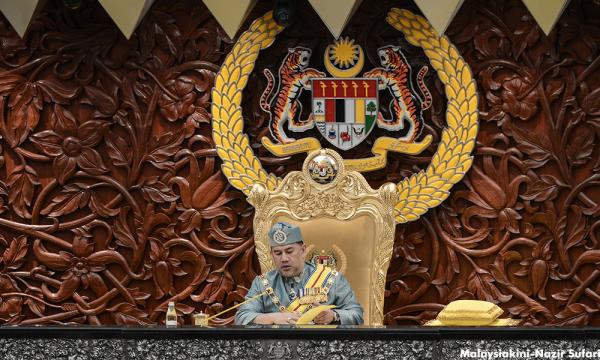In his maiden Royal Address at Parliament (fifth session) on March 6, 2017, the Yang di-Pertuan Agong (the Agong) raised a few issues inter alia, the cost of living, economy and the ringgit’s depreciation.
The Agong wanted the government to be relentless in its efforts to ease the people’s plight, especially those from the bottom 40 percent (B40) and the middle 40 percent (M40) of household income groups; and to continue to provide help and various incentives to enable them to attain higher income hence, addressing issues on the cost of living.
His Majesty also reminded the government to take the right steps to address the ringgit’s depreciation. He also expressed disappointment on the occurrence of fraud, corruption, leakages and leaks of government information involving government servants and former civil servants.
Wait a minute.
In March 2016, there was an article by Gerard Lourdesamy stating that it is known that the Royal Address to Parliament is written by the prime minister in consultation with the cabinet. A draft will be prepared by a cabinet committee and later sent to the Agong’s private secretary for any comment and minor amendments.
In essence it is a policy speech of the government which outlines the legislative programme for the coming parliamentary year. As a constitutional monarch, the Agong cannot publicly express his views on these matters as he is bound by convention. It is wrong to imply that the speech is actually personal to the Yang di-Pertuan Agong. To argue otherwise is untenable.
Be that as it may, I tried to search for earlier Royal Addresses but my efforts were in vain. I managed to source some info from newspaper reports only and that too is very limited. Since it was to be the government’s legislative programme for the coming year, it has to be an important document. Sadly, the Parliament website itself does not seem to archive it.
The point here is how do we measure the effectiveness of our Parliament.
The assembly of people in there is supposed to represent the rakyat and carry the voice, concerns and needs of the people. In the old days, it was an assemblage of the nobility, clergy and commons to act as the supreme legislative body.
From whatever little I got on the Royal Address at the fourth session (March 2016), the then-Agong also raised the issue of the well-being of the people, especially the bottom 40 percent and the middle 40 percent income groups.
I must say that I gave up trying to look for the Royal Address at the third session. I am quite sure there were other repetitive issues that have not been dealt with until now.
What is worrying, there are new issues emerging and the scale is damning. We gave justifications when Transparency International (TI) showed a lower score for our beloved country on corruption. The numbers and scale with which corruption, fraud and leakages are being done is really beyond imagination.
Thank God after a very, very long wait, last Friday, the Federal Territories Islamic Department (Jawi) drafted a sermon on the evils of corruption. I heard from a friend that in Penang, too, the sermon was on corruption. That proves the gravity of the situation.
The tip of the iceberg?
What we saw may only be the tip of the iceberg. They are the receivers and mostly from government servants. How about politicians, the private sector and the givers? Surely, the givers played a part unless the takers demanded it. I am not sure on the status if the giver termed it as a ‘donation with no strings attached’.
Kudos to the Malaysian Anti-Corruption Commission (MACC) for the recent exposes but what is more important is for us to see justice. So much public money have been siphoned out and we do not want to hear such things as there is no case because of not enough evidence or on technical grounds. If the latter is the issue, the Parliament should make it a point of urgency to come up with a law to plug any possible loopholes.
There is nothing strange where there is a law on possession of unauthorised classified documents. But it is kind of unusual when it outshines or is given prominence as compared to pinning down the perpetrators or culprits in corruption or even other cases. The question to ask is why the expose of classified documents has to happen?
Not a lot was said about the economy in the last Royal Address. Maybe the fundamentals are still strong.
But with unemployment creeping up to 3.5 percent in January 2017 (3.0 percent in 2014), we are talking about more than 500,000 unemployed Malaysians. GDP growth has dropped from 6 percent in 2014 to 4.2 percent in 2016. GDP per capita is still within the US$10,000 range.
We may boast that our economic growth is much better than Thailand or Philippines or our unemployment rate is better than the latter. But, it is not reflected in the strength of our currency. Comparing the Interbank Foreign Exchange Market rates released by Bank Negara on Jan 2, 2014 against Feb 28, 2017, the ringgit Malaysia has depreciated 28 percent and 20 percent compared to the Thai Baht and Philippines Peso respectively.
Believe it or not, it is kind of unusual.
As for the Parliament, I hope it will archive the older Royal Addresses for Malaysians to refer to online. I also hope that someday Malaysians will be able to read the Hansard online.
As a developed nation, we hope to see the quality of the debates by our parliamentarians and prove to us we have an assemblage of not only commons and clergy but also noble representatives.
What say you...
Menjunjung kasih diatas titah DYMM Yang di-Pertuan Agung.


